
As this is our third column on the Reverend Dr. Henry Pereira Mendes, we’ll begin with a summary of his life.
“Dr. Henry Pereira Mendes, son of the Reverend Abraham P. Mendes, was born in Birmingham, England, April 13, 1852. He received his Jewish education from his father who was the founder of Northwick College – a boarding school in London, where religious studies and secular education were combined, much on the style of the modern Day School. There is no evidence that he possessed Semichah – the traditional Orthodox Jewish ordination. He received his M.A. degree at the University College, London, and his Doctor of Medicine, at the University of the City of New York. He served as minister of the newly formed Sephardic Congregation of Manchester, England, 1874-1877, and was invited by Congregation Shearith Israel to succeed the Reverend Jacques Judah Lyons, serving the congregation up to 1923, as hazzan and minister.
“During his long career as minister of this historic congregation, he engaged in many communal activities and many a present prominent Jewish organization owes its origin in part to him. Among those he helped found were: the Jewish Theological Seminary of America, 1886; the New York Board of Ministers, 1881; the Montefiore Home for Chronic Invalids, 1884; the Jewish Branch of the Guild for Crippled Children, 1896; the Union of Orthodox Jewish Congregations of America, 1897; the American Federation of Zionists, and the Young Women’s Hebrew Association, 1902. He served all these groups and many others in an official capacity.”
Literary Works
“Notwithstanding these innumerable and multifarious communal and public activities, Dr. Mendes was actively and continuously engaged in literary work. His style is marked by emotional vigor and a poetic quality. He never wrote with a cold pen. Prolific though he was in so many literary genres – journalism, children’s stories, text books, commentaries, sermons, prayers, poems, dramas – his every word was [filled] with purpose and often touched with high passion. The note of pleading for ideals which motivated his whole life could always be heard, even in his ephemeral articles and in his large daily correspondence. Many of his editorials, articles, poems and translations from the Hebrew are to be found in the early pages of The American Hebrew. This journal was founded in 1897 by his brother, Frederick de Sola Mendes, and himself, together with Cyrus L. Sulzberger, Solomon Solis-Cohen, Jacob F. D. Solis, Daniel P. Hays, Max Cohen, Philip Cowen, Samuel Greenbaum, David Solis Ritterband, and Michael H. Cardozo. Many sermons, essays and articles from his pen have been republished in pamphlet form, notably ‘The Position of Woman in Jewish Law and Custom’ (1884), ‘The Sphere of Congregational Work’ (1885), ‘The Lifting of the Veil’ (1888), ‘Why I Am a Jew,’ ‘The Solution of War,’ ‘Peace Anthem,’ his ‘Farewell Message’ (1920), and ‘Fiftieth Anniversary Sermon’ (1927).”
He prepared a translation of the Book of Amos for the Jewish Publication Society of America and was a consulting editor for the first edition of the Jewish Encyclopedia that was published at the beginning of the twentieth century. He published numerous poems and wrote both a Purim and Chanukah play as well as a number of volumes dealing with Jewish liturgy.
The above is by no means exhaustive. Given all of the other things Reverend Mendes was involved in, it is astonishing that he had time for any literary activity at all.
Founding of JTS and the OU
By the 1880s Orthodox Judaism in the United States was in a deplorable state. There was almost no meaningful Jewish education, and the young increasingly turned their backs on religious observance. Many immigrants, who were observant in Eastern Europe, came under after the influence of Reform after arriving in America and abandoned basic Jewish practices such as keeping kosher and Shabbos. In addition, there was not even one institution at which young men could study to become Orthodox rabbis.
In 1886 Reverend Dr. Sabato Morais of Philadelphia proposed the founding of a Jewish Theological Seminary. Reverend Mendes played a key role in this endeavor.
Many readers may not be aware that the Jewish Theological Seminary was founded as an Orthodox institution. “Although a certain proportion of the organizing delegates and participating rabbis belonged to the Conservative wing of Judaism, the principles of the seminary, as declared in its charter of incorporation, granted by the Legislature of the State of New York on the ninth of May, 1886, were those of uncompromising adherence to the tenets of Orthodox Judaism.”
About the Author: Dr. Yitzchok Levine served as a professor in the Department of Mathematical Sciences at Stevens Institute of Technology, Hoboken, New Jersey before retiring in 2008. He now teaches as an adjunct at Stevens. Glimpses Into American Jewish History appears the first week of each month. Dr. Levine can be contacted at llevine@stevens.edu.
The words of this author reflect his/her own opinions and do not necessarily represent the official position of the Orthodox Union.

